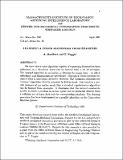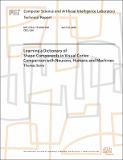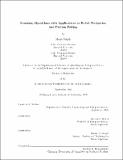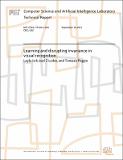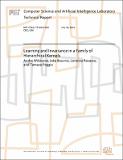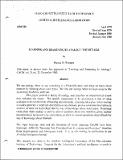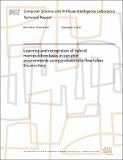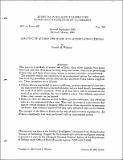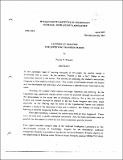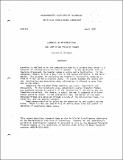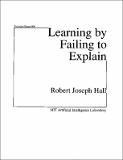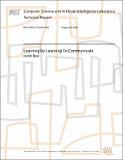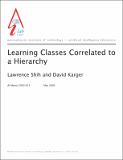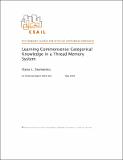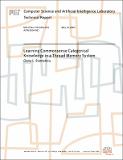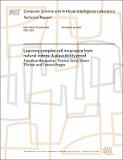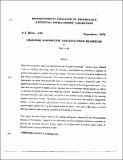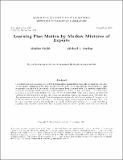Browsing Computer Science and Artificial Intelligence Lab (CSAIL) by Title
Now showing items 1798-1817 of 3804
-
Learning a Color Algorithm from Examples
(1987-06-01)We show that a color algorithm capable of separating illumination from reflectance in a Mondrian world can be learned from a set of examples. The learned algorithm is equivalent to filtering the image data---in which ... -
Learning a Dictionary of Shape-Components in Visual Cortex: Comparison with Neurons, Humans and Machines
(2006-04-25)In this thesis, I describe a quantitative model that accounts for the circuits and computations of the feedforward path of the ventral stream of visual cortex. This model is consistent with a general theory of visual ... -
Learning and disrupting invariance in visual recognition
(2011-09-10)Learning by temporal association rules such as Foldiak's trace rule is an attractive hypothesis that explains the development of invariance in visual recognition. Consistent with these rules, several recent experiments ... -
Learning and Example Selection for Object and Pattern Detection
(1996-03-13)This thesis presents a learning based approach for detecting classes of objects and patterns with variable image appearance but highly predictable image boundaries. It consists of two parts. In part one, we introduce our ... -
Learning and Invariance in a Family of Hierarchical Kernels
(2010-07-30)Understanding invariance and discrimination properties of hierarchical models is arguably the key to understanding how and why such models, of which the the mammalian visual system is one instance, can lead to good ... -
Learning and Reasoning by Analogy: The Details
(1979-04-01)We use analogy when we say something is a Cinderella story and when we learn about resistors by thinking about water pipes. We also use analogy when we learn subjects like Economics, Medicine and Law. This paper ... -
Learning and recognition of hybrid manipulation tasks in variable environments using probabilistic flow tubes
(2012-08-23)Robots can act as proxies for human operators in environments where a human operator is not present or cannot directly perform a task, such as in dangerous or remote situations. Teleoperation is a common interface for ... -
Learning by Augmenting Rules and Accumulating Censors
(1982-05-01)This paper is a synthesis of several sets of ideas: ideas about learning from precedents and exercises, ideas about learning using near misses, ideas about generalizing if-then rules, and ideas about using censors to ... -
Learning by Creating and Justifying Transfer Frames
(1978-01-01)In the particular kind of learning discussed in this paper, the teacher names a destination and a source. In the sentence, "Robbie is like a fox," Robbie is the destination and fox is the source. The student, on analyzing ... -
Learning by Creating and Justifying Transfer Frames
(1977-01-01)Learning is defined to be the computation done by a student when there is a transfer of information to him from a teacher. In the particular kind of learning discussed, the teacher names a source and destination. In ... -
Learning by Failing to Explain
(1986-05-01)Explanation-based Generalization requires that the learner obtain an explanation of why a precedent exemplifies a concept. It is, therefore, useless if the system fails to find this explanation. However, it is not ... -
Learning by Learning To Communicate
(2007-08-23)Human intelligence is a product of cooperation among many different specialists. Much of this cooperation must be learned, but we do not yet have a mechanism that explains how this might happen for the "high-level" agile ... -
Learning Classes Correlated to a Hierarchy
(2003-05-01)Trees are a common way of organizing large amounts of information by placing items with similar characteristics near one another in the tree. We introduce a classification problem where a given tree structure gives us ... -
Learning Commonsense Categorical Knowledge in a Thread Memory System
(2004-05-18)If we are to understand how we can build machines capable of broad purpose learning and reasoning, we must first aim to build systems that can represent, acquire, and reason about the kinds of commonsense knowledge that ... -
Learning Commonsense Categorical Knowledge in a Thread Memory System
(2004-05-18)If we are to understand how we can build machines capable of broadpurpose learning and reasoning, we must first aim to build systemsthat can represent, acquire, and reason about the kinds of commonsenseknowledge that we ... -
Learning complex cell invariance from natural videos: A plausibility proof
(2007-12-26)One of the most striking feature of the cortex is its ability to wire itself. Understanding how the visual cortex wires up through development and how visual experience refines connections into adulthood is a key question ... -
Learning Disjunctive Concepts From Examples
(1979-09-01)This work proposes a theory for machine learning of disjunctive concepts. The paradigm followed is one of teaching and testing, where the teaching is accomplished by presenting a sequence of positive and negative ... -
Learning Fine Motion by Markov Mixtures of Experts
(1995-11-01)Compliant control is a standard method for performing fine manipulation tasks, like grasping and assembly, but it requires estimation of the state of contact between the robot arm and the objects involved. Here we present ... -
Learning from Ambiguity
(1998-12-01)There are many learning problems for which the examples given by the teacher are ambiguously labeled. In this thesis, we will examine one framework of learning from ambiguous examples known as Multiple-Instance learning. ...
